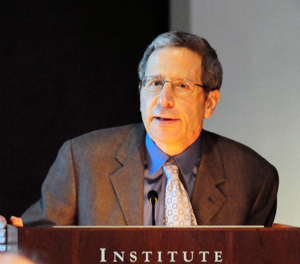Elections and Strategic Voting
 U.S. presidential elections often drive many citizens to vote strategically—to vote for a candidate they do not like in hope of preventing someone they dislike even more from winning. Many who favored Ralph Nader in the 2000 election ended up voting for Al Gore (though not enough to stop George W. Bush from getting elected). And a lot of those inclined toward Ross Perot in 1992 voted for George H. W. Bush instead (though Bill Clinton still won). An electoral system that induces widespread strategic voting, which is hardly unique to America, is undesirable for many reasons. Most obviously, it deprives citizens of the chance to express their views without fear that doing so will lead to the election of someone they strongly oppose. In this lecture, Eric Maskin, Albert O. Hirschman Professor in the School of Social Science and winner of the 2007 Nobel Memorial Prize in Economic Sciences, discusses how to design electoral systems that do not put voters in this bind.
U.S. presidential elections often drive many citizens to vote strategically—to vote for a candidate they do not like in hope of preventing someone they dislike even more from winning. Many who favored Ralph Nader in the 2000 election ended up voting for Al Gore (though not enough to stop George W. Bush from getting elected). And a lot of those inclined toward Ross Perot in 1992 voted for George H. W. Bush instead (though Bill Clinton still won). An electoral system that induces widespread strategic voting, which is hardly unique to America, is undesirable for many reasons. Most obviously, it deprives citizens of the chance to express their views without fear that doing so will lead to the election of someone they strongly oppose. In this lecture, Eric Maskin, Albert O. Hirschman Professor in the School of Social Science and winner of the 2007 Nobel Memorial Prize in Economic Sciences, discusses how to design electoral systems that do not put voters in this bind.